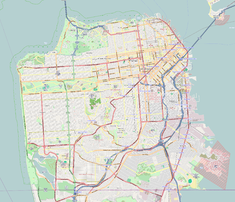Montgomery Block
| Montgomery Block | |
|---|---|
 The Montgomery Block in 1862 | |
| Location | 628 Montgomery Street, San Francisco, California, U.S. |
| Coordinates | 37°47′42″N 122°24′11″W / 37.795047°N 122.403122°W |
| Designated | March 29, 1933 |
| Reference no. | 80[1] |
The Montgomery Block, also known as Monkey Block and Halleck's Folly, was a historic building active from 1853 to 1959, and was located in San Francisco, California. It was San Francisco's first fireproof and earthquake resistant building.[2] It came to be known as a Bohemian center, from the late 19th to the middle of the 20th-century.[2]
Montgomery Block and later the site has been a registered California Historical Landmark since March 29, 1933.[1]
History
[edit]
It was located at 628 Montgomery Street, on the southeast corner of its intersection with Washington Street, today the location of the Transamerica Pyramid.
The four-story building was erected in 1853 by Henry Wager Halleck, later general in chief of the Union Army in the Civil War, in the "Barbary Coast" red-light district.[3] The four-stories Montgomery Block was the tallest building west of the Mississippi River when it was built in 1853.[4][5] It was designed by architect G.P. Cummings. San Franciscans called it "Halleck's Folly" because it was built on a raft of redwood logs.[3]
Also known as the Monkey Block, from 'Monty',[6] it housed many well-known lawyers, financiers, writers, actors, and artists.[1] It also hosted many frequenters of Coppa's restaurant, site of Goops murals, and illustrious visitors, among them The Crowd literary group, Jack London, George Sterling, Lola Montez, Lotta Crabtree, Gelett Burgess (and 'Les Jeunes'), Maynard Dixon, Frank Norris, Ambrose Bierce, Bret Harte, the Edwin Booths, and Mark Twain.
On May 14, 1856, the editor of the Daily Evening Bulletin, James King of William, died in the Montgomery Block, having been shot by James P. Casey,[1] a city supervisor who felt slighted by King's anti-corruption crusading journalism.[citation needed]
The building survived the 1906 earthquake and fire.[1]
Demolition and legacy
[edit]The Montgomery Block was demolished in 1959, even though a preservation movement had begun to emerge in San Francisco. It was replaced by a parking lot and later, the Transamerica Pyramid.
The building is remembered for its historic importance as a bohemian center of the city. At his inauguration as Poet Laureate of San Francisco in 1998, Lawrence Ferlinghetti mentioned "the classic old Montgomery Block building, the most famous literary and artistic structure in the West".[7]
References
[edit]- ^ a b c d e "Montgomery Block". Office of Historic Preservation, California State Parks. Retrieved 2012-10-14.
- ^ a b Kamiya, Gary (2018-10-26). "Iconic SF building was home to Bohemians for decades. Then it was destroyed". San Francisco Chronicle. Retrieved 2022-11-29.
- ^ a b Leah Caracappa: The Bohemians of San Francisco's 'Monkey Block' Poetrybay, Winter 2005 edition
- ^ William Hjortsberg (1 April 2012). Jubilee Hitchhiker: The Life and Times of Richard Brautigan. Counterpoint LLC. ISBN 978-1-61902-045-0.
- ^ Matthew Poole; Erika Lenkert (2 February 2010). Frommer's San Francisco 2010. John Wiley & Sons. p. 206. ISBN 978-0-470-59486-5.
- ^ Herb Caen, "This Old Town," San Francisco Examiner, December 17, 1967, image 105
- ^ Ferlinghetti, Lawrence (2002). San Francisco Poems. San Francisco: City Lights. p. 14.
Further reading
[edit]- Jones, Idwal, Ark of Empire: San Francisco's Montgomery Block (New York: Ballantine Books, 1951 / Comstock ed, 1972, ISBN 978-0345028945)
- O'Brien, Robert, This Is San Francisco (New York: Whittlesey House, 1948; San Francisco: Chronicle Books, 1994)
External links
[edit]- History of San Francisco
- Demolished buildings and structures in San Francisco
- Office buildings completed in 1853
- Buildings and structures demolished in 1959
- California Historical Landmarks
- Demolished buildings and structures in California
- Landmarks in San Francisco
- Culture of San Francisco
- San Francisco Bay Area literature
- 1853 establishments in California
- 1959 disestablishments in California
- Arts organizations based in the San Francisco Bay Area

